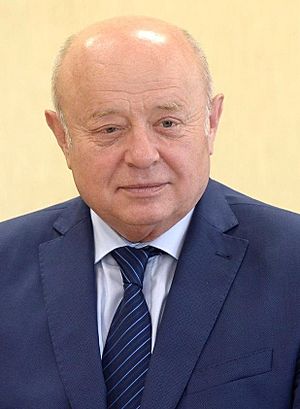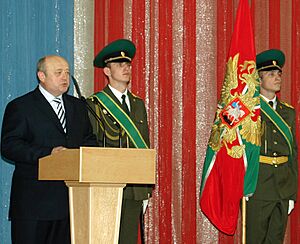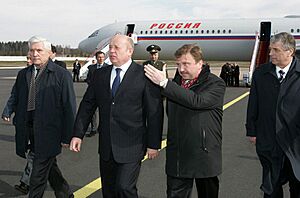Mikhail Fradkov facts for kids
Quick facts for kids
Mikhail Fradkov
|
|
|---|---|
|
Михаил Фрадков
|
|

Fradkov in 2016
|
|
| Director of the Russian Institute for Strategic Studies | |
| Assumed office 4 January 2017 |
|
| Preceded by | Leonid Reshetnikov |
| Director of the Foreign Intelligence Service | |
| In office 6 October 2007 – 5 October 2016 |
|
| President | Vladimir Putin Dimitry Medvedev Vladimir Putin |
| Preceded by | Sergei Lebedev |
| Succeeded by | Sergey Naryshkin |
| Prime Minister of Russia | |
| In office 5 March 2004 – 14 September 2007 |
|
| President | Vladimir Putin |
| Preceded by | Mikhail Kasyanov |
| Succeeded by | Viktor Zubkov |
| Chairman of the Council of Ministers of the Union State |
|
| In office 11 March 2004 – 15 October 2007 |
|
| Preceded by | Mikhail Kasyanov |
| Succeeded by | Viktor Zubkov |
| Personal details | |
| Born |
Mikhail Yefimovich Fradkov
1 September 1950 Kuybyshev, Russian SFSR, Soviet Union |
| Citizenship | Russia |
| Political party | CPSU (until 1991) Fatherland – All Russia (1998—2002) United Russia (from 2004) |
| Spouse | Elena Ludenko-Fradkova |
| Children | Petr, Pavel |
| Alma mater | STANKIN |
| Awards | Order of Honour |
Mikhail Yefimovich Fradkov (born on September 1, 1950) is a well-known Russian politician. He served as the Prime Minister of Russia from 2004 to 2007. After that, he became the longest-serving director of Russia's Foreign Intelligence Service from 2007 to 2016. Since January 4, 2017, Fradkov has been the Director of the Russian Institute for Strategic Studies.
His government was the first in Russia's history to step down voluntarily. He holds a high rank in the government's civilian service.
Contents
Early Life and Education
Mikhail Fradkov was born near Samara, a city in Russia. He studied at two important universities in Moscow. He graduated from the Moscow Machine Tool Design Institute in 1972. Later, he also graduated from the Foreign Trade Academy in 1981.
In 1973, he worked in the economic section of the Soviet Union's embassy in India. An embassy is like an official office for one country in another country. He stayed there for two years. After that, he held several jobs back in Russia. In 1991, he represented Russia at the General Agreement on Tariffs and Trade (GATT) in Geneva. GATT was an agreement to help countries trade more easily.
Political Career
In late 1992, Fradkov became a Deputy Minister for Foreign Economic Relations. This meant he helped manage Russia's trade with other countries. In October 1993, he became the First Deputy Minister.
On April 15, 1997, Boris Yeltsin, who was the President at the time, made Fradkov the Minister of Foreign Economic Relations and Trade. He held this important job for almost a year. In 1999, he became the Minister of Trade.
In 2001, Vladimir Putin appointed him as the director of the Federal Tax Police. Before this, he was also a Deputy Secretary of the Security Council. In 2003, he became Russia's representative to the European Union. This role involved working with European countries.
On March 1, 2004, President Putin chose Fradkov to be the next Prime Minister. The Duma, which is like Russia's parliament, approved this choice on March 5.
Becoming Prime Minister
Many people were surprised when Fradkov was chosen as Prime Minister. He was not seen as being very close to President Putin. Some experts thought Putin chose him because he was not part of any of the powerful groups in the government. Former Prime Minister Sergei Stepashin said Fradkov was "absolutely independent." President Putin and his supporters praised Fradkov for being experienced, professional, and honest.
On May 12, 2004, Fradkov was appointed Prime Minister for a second time. This happened after Vladimir Putin won the presidential election again.
On September 12, 2007, Fradkov told President Putin that he wanted to resign. Putin accepted his resignation. He thanked Fradkov for his work and said he would stay in office until a new Prime Minister was chosen. Viktor Zubkov was confirmed as the new Prime Minister on September 14, 2007.
Head of Foreign Intelligence Service
On October 6, 2007, President Putin announced that Fradkov would become the head of the Foreign Intelligence Service. This agency gathers information about other countries to protect Russia's interests.
Fradkov's experience, including his time in India, suggested he had a background in intelligence work. This helped explain why President Putin trusted him with such an important role.
In November 2010, there were reports that one of Fradkov's intelligence officers had left Russia and gone to the United States. This officer was said to have shared information about a Russian spy group in the United States. Some critics said that suspicions about this officer should have been investigated more carefully.
Mikhail Fradkov's son, Pavel Fradkov, also holds a government position. He is a deputy head of the state property watchdog called Rosimushchestvo.
Leading the Government (2004–2007)
Mikhail Fradkov became the Chairman of the Government of the Russian Federation in March 2004. He took over from the previous Prime Minister, Mikhail Kasyanov.
In early March 2004, the State Duma strongly agreed to Fradkov becoming Prime Minister. Many political parties supported him. They noted his experience in government and his international work.
Many experts believed Fradkov was a "technical prime minister." This means he followed the President's plans rather than making his own big policy decisions. The main decisions were made by the President's office.
During Fradkov's time as Prime Minister, his government took several important steps:
- Administrative Reform: They reorganized government departments in 2004.
- Social Benefits: They changed how social benefits were given. Instead of receiving goods or services, people started getting money. This change caused some protests in early 2005.
- Housing Project: They started a project to make housing more affordable and comfortable for Russian citizens.
- National Projects: They launched national projects focused on improving "Health" and "Education."
- Housing and Utilities Reform: They began reforms to improve housing and public services. The goal was to get businesses involved in these areas and to help people get mortgages for homes.
- EGAIS System: They introduced a system called EGAIS. This system helped the government track the production and sale of alcohol. However, there were some technical problems when it was first introduced in 2006.
On November 14, 2005, President Vladimir Putin created two new positions in the government. These changes reduced some of the Prime Minister's powers. Dmitry Medvedev became the first deputy chairman, in charge of big national projects. Sergei Ivanov, the Minister of Defense, became a deputy chairman for defense matters.
On September 12, 2007, Fradkov offered his resignation to President Putin. He explained that he wanted the President to have complete freedom in choosing new leaders. President Putin accepted the resignation. He thanked Fradkov for his achievements, like good economic growth and lower inflation. Putin also noted the start of major social projects. Fradkov continued to serve as Prime Minister until a new one was approved.
After Fradkov resigned, a poll showed that most Russians could not name any specific achievements or failures of his time as Prime Minister.
Sanctions
In April 2018, the United States placed sanctions on Mikhail Fradkov. Sanctions are like official restrictions. In 2022, the UK government also placed sanctions on him. These actions were related to the Russo-Ukrainian War.
Honours and Awards
Mikhail Fradkov has received several important awards for his service:
- Order of Merit for the Fatherland;
- 1st class (September 12, 2007) – for his great work in socio-economic policy.
- 2nd class (September 1, 2005) – for his important contributions to the country's economic policy and many years of honest work.
- Order of Honour
- Medal "In Commemoration of the 850th Anniversary of Moscow"
- Medal "For Valiant Labour. To commemorate the 100th anniversary of Lenin's birth"
- Fellow Russian counter-intelligence – for strengthening ties between government departments.
See also
 In Spanish: Mijaíl Fradkov para niños
In Spanish: Mijaíl Fradkov para niños
 | Roy Wilkins |
 | John Lewis |
 | Linda Carol Brown |



